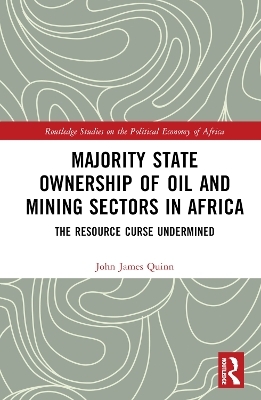
Majority State Ownership of Oil and Mining Sectors in Africa
Routledge (Verlag)
978-1-138-39033-1 (ISBN)
Examining natural resource exporting nations in sub-Saharan Africa between 1966 to 2000, Quinn shows that on average, states with majority state ownership of these sectors featured lower growth, lower incomes, declining alternative export sectors, more debt, lower levels of investment, lower levels of political and civil rights, and more domestic conflict than other similar countries. These results remained fairly consistent across both cross-country data, as well as in paired case studies. One surprise finding is that these countries either had depreciating currencies, or did not feature high levels of currency appreciation, on average, which is inconsistent with resource curse literature predictions. Rather, most countries with majority state ownership had high levels of currency overvaluation – which operated in a similar manner as currency appreciation.
This work should appeal to students and faculty interested in the political economy of development, the natural resource curse, and African development, as well as politicians, policy makers, and NGO workers working in these areas. The strong recommendation of the book is that governments should control 50% or less of these sectors.
John James Quinn (UCLA, PhD) is a Professor of Political Science at Truman State University where he writes about issues concerning African development and democratization using the lenses of international relations, comparative politics, and international political economy. His African experiences include being a Peace Corp Volunteer in the Democratic Republic of the Congo (formerly Zaire) as well as a being a visiting professor at the University of Ghana-Legon. His primary research interest links majority state ownership of significant economic sectors in Africa to subsequent political, economic, and social outcomes. He has also written on the diffusion of the Rwandan genocide and Mobutu’s ouster, the determinates of French ODA to Africa (during and after Cold War), the links between democracy and development in Africa, causes of corruption cross nationally, African foreign policies, and the types of political parties that emerged in Africa following the recent multiparty elections. He is author of prior two books: The Road oft Traveled: Development Polices and Majority State Ownership of Industry in Africa and Global Geopolitical Power and African Political and Economic Institutions.
Chapter 1: The Resource Curse and Majority State Ownership of Oil or Mineral Exporting Sectors in Sub-Saharan Africa
Chapter 2: Oil or Mineral Exporting, Majority State Ownership, and Resource Curse Outcomes: A Preliminary Cross-Sectional Statistical Analysis
Chapter 3: Oil Exporting, Majority State Ownership, and Resource Curse Outcomes in Paired Case Studies
Chapter 4: Mineral Exporting, Majority State Ownership, and Resource Curse Outcomes in Paired Case Studies
Chapter 5: Updating Post-2000 Trends: Status of Ownership, New Exporting Nations, Economic and Political Liberalization, and International Changes Impacting Mineral or Oil Exporting Nations
Chapter 6: Conclusions and Implications for Oil or Mineral Exporting Nations
| Erscheinungsdatum | 06.09.2024 |
|---|---|
| Reihe/Serie | Routledge Studies on the Political Economy of Africa |
| Zusatzinfo | 3 Tables, black and white |
| Verlagsort | London |
| Sprache | englisch |
| Maße | 156 x 234 mm |
| Gewicht | 530 g |
| Themenwelt | Naturwissenschaften ► Biologie ► Ökologie / Naturschutz |
| Naturwissenschaften ► Geowissenschaften ► Geografie / Kartografie | |
| Sozialwissenschaften ► Politik / Verwaltung ► Vergleichende Politikwissenschaften | |
| Sozialwissenschaften ► Soziologie ► Spezielle Soziologien | |
| Wirtschaft ► Volkswirtschaftslehre ► Wirtschaftspolitik | |
| ISBN-10 | 1-138-39033-X / 113839033X |
| ISBN-13 | 978-1-138-39033-1 / 9781138390331 |
| Zustand | Neuware |
| Haben Sie eine Frage zum Produkt? |
aus dem Bereich


